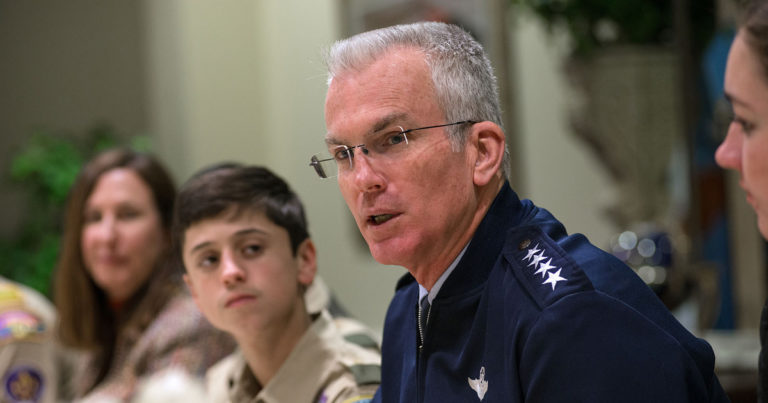High-ranking Eagle Scout at the Pentagon shares strong words about Scouting

Ron K., an Eagle Scout from North Carolina, opened the lunch by saying grace.
“Please let us have fun in Washington,” he said, “but do our business, too.”
On Monday, in a special dining room deep inside the Pentagon, the Report to the Nation delegates had lunch with Gen. Paul Selva. And while the lunch conversation included some business, it was also really fun.
Selva is vice chairman of the Joint Chiefs, making the four-star general our country’s second-highest-ranking military officer.

A bit of business
Selva earned the Eagle Scout award in 1974 and says those Scouting lessons stuck around through a career that has spanned nearly four decades.
“The tools that I learned as a Scout have paid dividends across the 37 years,” he said. “Over time, I’ve learned that the most important one is about trust.”
He trusted other teenagers in his Boy Scout patrol. In the Air Force, he trusted his co-pilot. And at the Pentagon, he trusts his staff to do what they say they’ll do.
“I tell people that the military runs at the speed of trust,” he said. “It’s all about trust, and y’all live that every day, as Scouts.”
After the delegates handed Selva his copy of the Report to the Nation, the general spotted the words “Prepared. For Life.” at the top. That three-word theme describes how the Boy Scouts of America prepares future leaders.
“Prepared for life, right? It’s true,” he said. “It works. I’m proof. The tools you’re learning really will help you across your lifetime.”
A bit of fun
Bill Rosner, one half of the Report to the Nation host couple, asked a question we all were thinking.
“Did you get the Aviation merit badge when you were a Scout?”
“I did not,” Selva said, explaining that he grew up overseas where earning the merit badge would’ve been difficult.
He did live near the ocean, and he remembers earning the Sailing and Rowing merit badges on the open water.
“It’s going to sound weird for an Air Force guy, but if it involved the ocean, I got that merit badge,” he said.

Prepared. To Hike.
Selva said he and his wife love to hike, but they can’t just toss on their backpacks and go.
When you’re a high-ranking military officer, your security detail follows you everywhere. After all, Selva must be ready to make important military decisions anywhere on the planet.
The couple is planning a hiking trip, and Selva said the security team has been eager to protect him as they tag along. It sure beats another day in the black Suburbans.
“It’s amazing who comes out of the woodwork,” he said. “One of the comm guys says, ‘You know, we have this little satellite comm system, and we never get to use it. Every place you stop, you’ll have comms.’ And I said, ‘The reason I walk out by myself is because I don’t want to have comms.’ And he said, ‘Sorry, that’s not an option.’ And I said, ‘OK, then we’re going to drag you to some pretty remote places.’”
In the meantime, Selva and his wife take hikes near their home, “because we like to stay ready to go camping at any time. The security detail doesn’t like that either.”

Robert Work, Deputy Secretary of Defense
This wasn’t the first time Robert Work, the deputy secretary of defense, has hosted Report to the Nation delegates.
The second-highest-ranking civilian at the Pentagon, Work says he was a Cub Scout for a couple of years.
“I look back and say, ‘Man, I should’ve stuck with it,’” he said.
Midway through the meeting with the Scouts, Work left abruptly — but not for long.
“I’m going to leave for one second, but don’t anybody move,” he said. “I’m going to show you something.”
He returned with a copy of last year’s Report to the Nation and the Boy Scout Handbook last year’s delegates had given him. These items weren’t stuck in a drawer somewhere — they were displayed in the deputy secretary’s office.
“Everybody who comes into my office sees this,” he said. “I just wanted to prove it to you.”

Lt. Gen. Gary Cheek, Director of the Army Staff
The day’s final meeting was with Lt. Gen. Gary Cheek, director of the Army staff.
The Scouts were led into a conference room where eight microphones hung from the ceiling. The walls were equipped with videoconferencing devices. Clocks above one screen displayed the current time in Iraq, Afghanistan, Korea and other key locations around the globe.
You got the sense that critical decisions were made in this room almost daily.
Cheek told the Scouts that the Army conducted a study a few years ago to determine who joins the Army and who stays in the Army.
“There were two things that had someone stay in the Army,” he said. “One is if their parents had served in the Army, and the second is if they were an Eagle Scout.”
Cheek saw in that study evidence that Scouts are different.
“What that says about all you is that you stick with things more than your peers in school. It probably shows you’ve got a little more tenacity than your peers,” he said. “So good on you. I’m proud of you.”
Cheek left the Scouts after telling them he had hiked Philmont twice — once at age 15 and again with both of his sons.
“It’s a great place,” he said.
Follow the Report to the Nation
Find more coverage here, and follow me on Twitter: @bryanonscouting.
Photos by Michael Roytek and Randy Piland. See more photos here.
Watch the Day 3 recap
High-ranking Eagle Scout at the Pentagon shares strong words about Scouting
